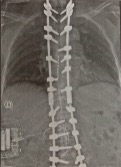Abstracts
Vol. 2 No. s1 (2025): 48th National Conference of the Italian Association for the Study of Pain
MULTIDISCIPLINARY MANAGEMENT OF REFRACTORY FAILED BACK SURGERY SYNDROME: A COMPLEX CASE REPORT WITH MULTIMODAL INTERVENTIONS AND LITERATURE REVIEW
D. Gemma1, G. Pulito2 | 1"Cardinale G. Panico" Hospital, Tricase (Lecce); 2"V. Fazzi" Hospital, Lecce
Publisher's note
All claims expressed in this article are solely those of the authors and do not necessarily represent those of their affiliated organizations, or those of the publisher, the editors and the reviewers. Any product that may be evaluated in this article or claim that may be made by its manufacturer is not guaranteed or endorsed by the publisher.
All claims expressed in this article are solely those of the authors and do not necessarily represent those of their affiliated organizations, or those of the publisher, the editors and the reviewers. Any product that may be evaluated in this article or claim that may be made by its manufacturer is not guaranteed or endorsed by the publisher.
Published: 22 September 2025
26
Views
0
Downloads








